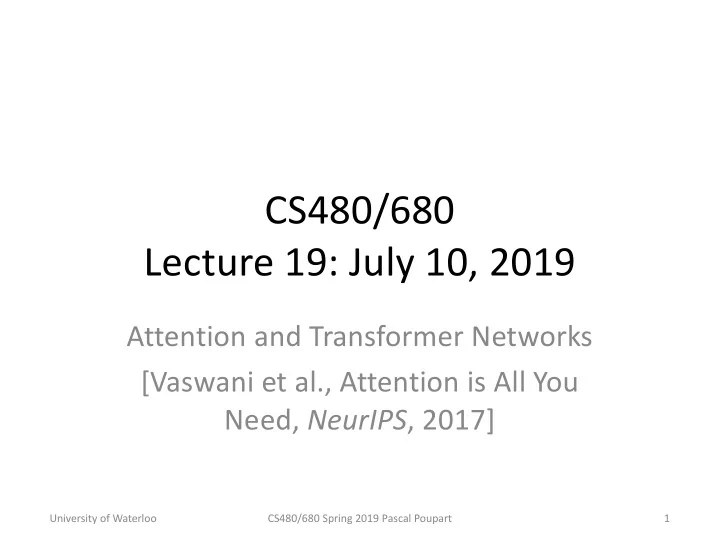

CS480/680 Lecture 19: July 10, 2019 Attention and Transformer Networks [Vaswani et al., Attention is All You Need, NeurIPS , 2017] University of Waterloo CS480/680 Spring 2019 Pascal Poupart 1
Attention • Attention in Computer Vision – 2014: Attention used to highlight important parts of an image that contribute to a desired output • Attention in NLP – 2015: Aligned machine translation – 2017: Language modeling with Transformer networks University of Waterloo CS480/680 Spring 2019 Pascal Poupart 2
Sequence Modeling Challenges with RNNs Transformer Networks • Long range dependencies • Facilitate long range dependencies • Gradient vanishing and • No gradient vanishing and explosion explosion • Large # of training steps • Fewer training steps • Recurrence prevents • No recurrence that facilitate parallel computation parallel computation University of Waterloo CS480/680 Spring 2019 Pascal Poupart 3
Attention Mechanism • Mimics the retrieval of a value ! " for a query # based on a key $ " in database • Picture %&&'(&)*( #, ,, - = ∑ " 0)1)2%3)&4 #, $ " ×! " University of Waterloo CS480/680 Spring 2019 Pascal Poupart 4
Attention Mechanism • Neural architecture • Example: machine translation – Query: ! "#$ (hidden vector for % − 1 () output word) – Key: ℎ + (hidden vector for , () input word) – Value: ℎ + (hidden vector for , () input word) University of Waterloo CS480/680 Spring 2019 Pascal Poupart 5
Transformer Network • Vaswani et al., (2017) Attention is all you need. • Encoder-decoder based on attention (no recurrence) University of Waterloo CS480/680 Spring 2019 Pascal Poupart 6
Multihead attention • Multihead attention: compute multiple attentions per query with different weights !"#$%ℎ'() *, ,, - = / 0 1231($ ℎ'() 4 , ℎ'() 5 , … , ℎ'() 7 9 *, / ; - : ,, / ℎ'() 8 = ($$'3$%23 / 8 8 8 9 ? : ($$'3$%23 *, ,, - = <2=$!(> @ A - University of Waterloo CS480/680 Spring 2019 Pascal Poupart 7
Masked Multi-head attention • Masked multi-head attention: multi-head where some values are masked (i.e., probabilities of masked values are nullified to prevent them from being selected). • When decoding, an output value should only depend on previous outputs (not future outputs). Hence we mask future outputs. 0 1 2 !""#$"%&$ ', ), * = ,&-".!/ 3 4 * 0 1 289 .!,5#67""#$"%&$ ', ), * = ,&-".!/ * 3 4 where : is a mask matrix of 0’s and −∞ ’s University of Waterloo CS480/680 Spring 2019 Pascal Poupart 8
Other layers • Layer normalization: – Normalize values in each layer to have 0 mean and 1 variance – For each hidden unit ℎ " compute ℎ " ← $ % (ℎ " − () where * is a variable, ( = , , - - - ∑ "/, - ∑ "/, ℎ " − ( 1 ℎ " and 0 = – This reduces “covariate shift” (i.e., gradient dependencies between each layer) and therefore fewer training iterations are needed • Positional embedding – Embedding to distinguish each position 23 456"7"58,1" = sin(=>?@A@>B/10000 1"/F ) 23 456"7"58,1"G, = cos(=>?@A@>B/10000 1"/F ) University of Waterloo CS480/680 Spring 2019 Pascal Poupart 9
Comparison • Attention reduces sequential operations and maximum path length, which facilitates long range dependencies University of Waterloo CS480/680 Spring 2019 Pascal Poupart 10
Results University of Waterloo CS480/680 Spring 2019 Pascal Poupart 11
GPT and GPT-2 • Radford et al., (2018) Language models are unsupervised multitask learners – Decoder transformer that predicts next word based on previous words by computing !(# $ |# &..$(& ) – SOTA in “zero-shot” setting for 7/8 language tasks (where zero-shot means no task training, only unsupervised language modeling) University of Waterloo CS480/680 Spring 2019 Pascal Poupart 12
BERT (Bidirectional Encoder Representations from Transformers) • Devlin et al., (2019) BERT: Pre-training of Deep Bidirectional Transformers for Language Understanding – Decoder transformer that predicts a missing word based on surrounding words by computing !(# $ |# &..$(&,$*&..+ ) – Mask missing word with masked multi-head attention – Improved state of the art on 11 tasks University of Waterloo CS480/680 Spring 2019 Pascal Poupart 13
Recommend
More recommend